The Uncomfortable Oxford™ museum tour examines how the university’s collections and landmarks reflect its historical ties to British imperialism. Guided by an Oxford student, visitors encounter artifacts amassed through colonial expeditions, witness architecture evoking England’s imperial past, and critically explore the institution’s connections to prominent imperialists. This immersive exploration encourages a nuanced understanding of Oxford’s entanglement with the forces of global dominance, as well as the ongoing efforts to reckon with this troubling legacy. Delving into this complex history reveals the ways in which curiosity and colonial expansion have long intersected, raising important questions about the role of elite institutions in shaping imperialist ideologies.
Key Points

- The tour provides an immersive exploration of Oxford University’s historical connections to British colonialism and its lasting impact.
- The tour critically examines how Oxford’s institutions, museums, and landmarks reflect the university’s role in shaping imperialist ideologies.
- The Natural History Museum and Pitt Rivers Museum serve as reminders of Oxford’s active involvement in the imperialist project of cataloging and commodifying the natural world.
- The tour explores the ethical implications of Oxford’s historical relationship with colonial figures like Cecil Rhodes and the ongoing debates surrounding his legacy.
- The tour offers a personalized, guided experience led by an Oxford University student, providing insights into the complex legacies of Oxford’s entanglement with the forces of imperialism.
Overview of the Tour
The Curiosity & Colonialism – Museum Tour by Uncomfortable Oxford provides an opportunity for visitors to explore the ties between the city of Oxford and the British Empire, delving into the impact of imperialism on the university and its institutions.
The private guided walking tour, led by an Oxford University student, takes participants through several museums, including the Natural History Museum and the Pitt Rivers Museum, as well as notable colleges like Rhodes House, New College, and the Oxford Martin School.
This immersive experience offers deeper insights into Oxford’s historical connections to colonialism, catering to those seeking a more comprehensive understanding of the city’s complex past.
Ready for more culture? More museums we feature in Oxford
Exploring Oxford’s Imperialist Ties
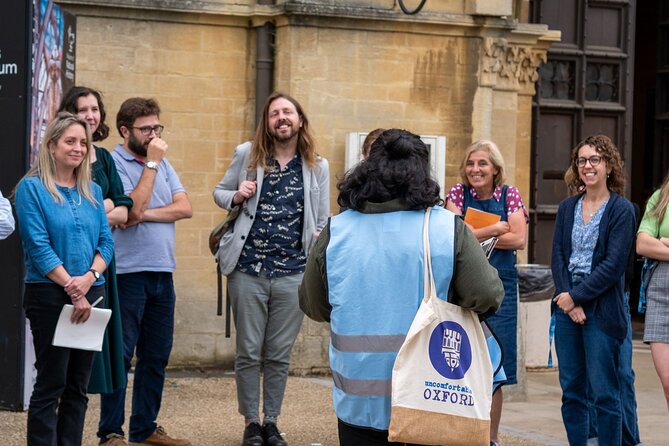
Oxford’s deep historical ties to the British Empire are woven throughout the city’s institutions, museums, and architectural landmarks, reflecting the university’s role in shaping and perpetuating imperialist ideologies.
The Pitt Rivers Museum, for instance, houses an extensive collection of artifacts amassed during colonial expeditions, while the Rhodes House on the university campus is named after Cecil Rhodes, a prominent imperialist whose legacy is a subject of ongoing controversy.
Even the New College features architectural elements that evoke England’s imperial past.
Through this tour, participants can critically examine how Oxford’s history is inextricably linked to Britain’s colonial past and explore the complex legacy of imperialism that still lingers within the city’s renowned institutions.
Natural History Museum Highlights

Visitors exploring the Natural History Museum will find a wealth of exhibits that illuminate the university’s deep ties to the British Empire. The museum’s extensive collection of specimens, gathered from across the colonies, reflects Oxford’s active role in the imperialist project of cataloging and commodifying the natural world.
Displays feature exotic animals, plants, and minerals, underscoring how Oxford’s scientific pursuits were inextricably linked to the colonial endeavor. Visitors will gain insights into the institution’s complicity in the expansion of imperial power and the extraction of natural resources from colonized lands.
The museum offers a sobering reminder of the complex legacy of Britain’s global dominance and the ways in which academic institutions were complicit in these historical injustices.
Pitt Rivers Museum Insights

Exploring the Pitt Rivers Museum further illuminates the university’s entanglement with Britain’s colonial past. Its expansive ethnographic collection, amassed through the exploits of colonial administrators and travelers, highlights how Oxford’s scholarly pursuits were deeply entwined with the imperial project.
Visitors will encounter an array of cultural artifacts that were extracted from colonized lands, serving as tangible reminders of the uneven power dynamics that shaped academic inquiry during the era of European expansionism.
The museum’s displays compel visitors to grapple with the legacies of colonialism that continue to shape academic institutions like Oxford. This complex history is a crucial part of understanding the university’s role in the colonial enterprise.
Rhodes House and Its Legacy
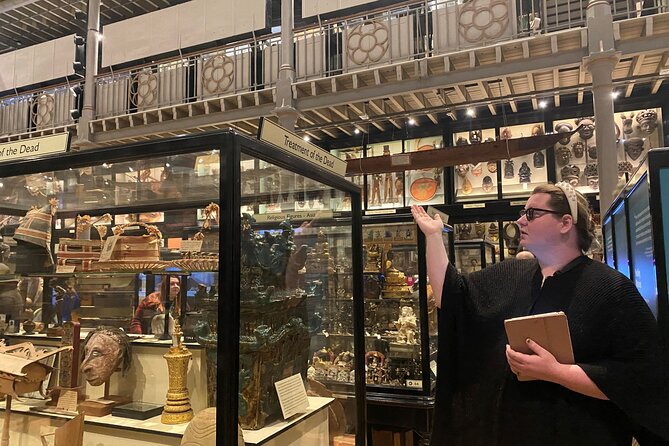
The imposing Rhodes House, named after the notorious British imperialist Cecil Rhodes, stands as a tangible symbol of Oxford University’s deep ties to the colonial project. Its grandiose architecture and endowment, funded by Rhodes’ wealth amassed through exploitative mining operations in southern Africa, underscore how the university benefited from and was complicit in the expansion of the British Empire.
This tour explores the complex legacy of Rhodes House, which continues to spark debates about Oxford’s colonial history and its lasting impact:
- The university’s historical relationship with British imperialism and Cecil Rhodes
- The ethical implications of accepting funds from colonial profiteers
- Ongoing student protests and campaigns to remove Rhodes’ statue
- The need for critical examination and reckoning with Oxford’s colonial past
- 1.5-hour Oxford University and Colleges Walking Tour
- Oxford Official University & City Tour
- Oxford University Walking Tour With University Alumni Guide
- Inspector Morse, Lewis and Endeavour Oxford Walking Tour
- Harry Potter Walking Tour of Oxford Including New College
- Oxford Harry Potter Insights Entry to Divinity School PUBLIC Tour
Visiting New College
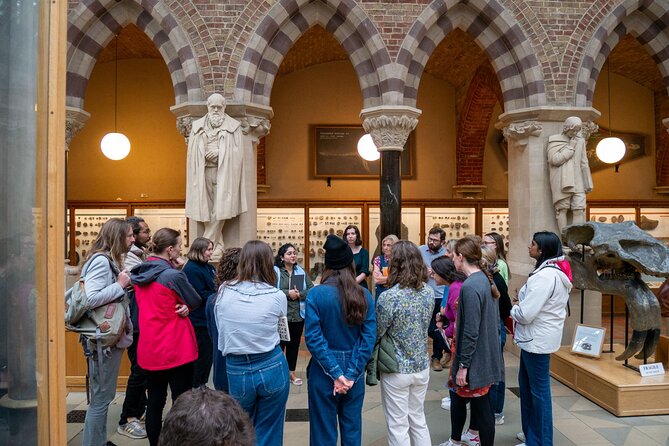
Amid the grand Gothic architecture of Oxford, New College stands as a testament to the university’s storied past, its medieval origins complemented by contemporary scholarship.
Established in 1379, the college’s iconic towers and cloisters have witnessed centuries of intellectual pursuit, making it a pivotal stop on the Curiosity & Colonialism tour.
Tour you will explore the college’s links to the British Empire, examining how its endowments and benefactors were shaped by the colonial era.
As they navigate the college’s historic halls, they’ll uncover the complex legacies that linger within these walls, gaining a deeper understanding of Oxford’s entanglement with the forces of imperialism that defined much of Britain’s history.
Oxford Martin School Significance
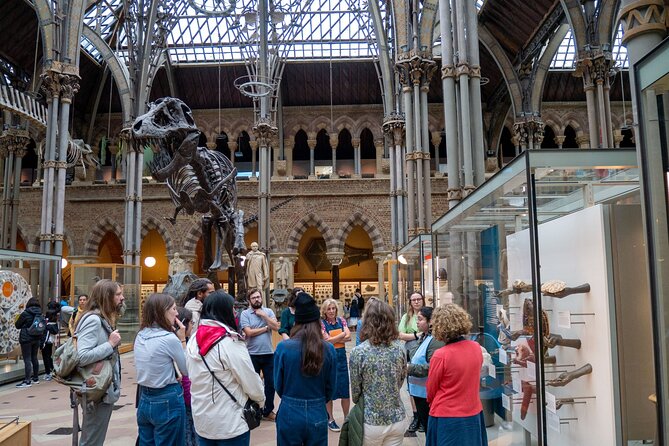
After uncovering the complex legacies within the hallowed halls of New College, the Curiosity & Colonialism tour culminates at the Oxford Martin School, a modern institution dedicated to tackling global challenges.
The School’s existence on Broad Street serves as a stark contrast to the historical weight of its surroundings, emphasizing Oxford’s evolution as a hub for cutting-edge research and interdisciplinary collaboration.
Visitors learn how the School:
- Brings together leading thinkers to address issues like climate change, pandemics, and technological disruption
- Promotes innovative solutions that leverage diverse academic disciplines
- Fosters an environment of intellectual curiosity and social responsibility
- Equips the next generation of leaders with the tools to create positive global impact
Tour Accessibility and Details
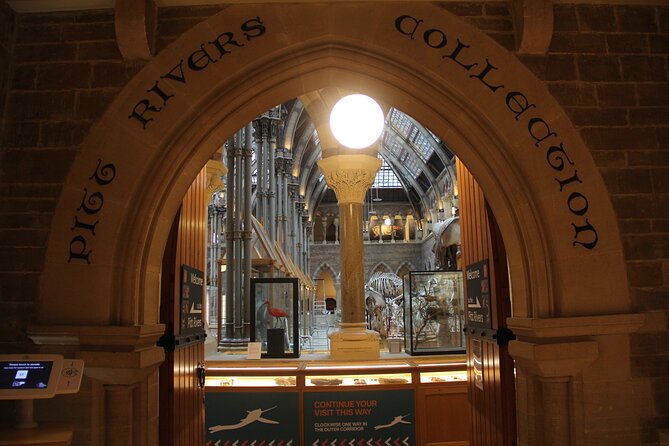
The Curiosity & Colonialism museum tour is accessible for visitors with service animals and wheelchair users. The tour is situated near public transportation.
The tour group size is limited to a maximum of 15 travelers, ensuring a personalized experience. The private guided walking tour is led by an Oxford University student guide and explores the ties between Oxford and the British Empire, providing deeper insights into the impact of imperialism.
The tour includes entry into several museums, such as the Natural History Museum, Pitt Rivers Museum, and colleges like Rhodes House, New College, and Oxford Martin School.
The tour starts at 10:30 am, making it an ideal way for visitors to explore Oxford’s complex history.
Frequently Asked Questions
Can I Bring My Own Food and Drinks on the Tour?
Yes, visitors are generally welcome to bring their own food and drinks on the tour. However, it’s best to check with the tour operator beforehand to confirm any specific policies or restrictions.
Do I Need to Book the Tour in Advance?
Yes, it’s recommended to book the tour in advance. The tour has a maximum of 15 travelers, so pre-booking ensures you secure your spot on the preferred date and time. This private tour offers a personalized experience.
Is the Tour Available in Languages Other Than English?
The tour is only offered in English. The website does not mention any availability for other languages. Visitors who require translation services would need to arrange for their own interpreter to join the tour.
Can I Leave the Tour at Any Point and Rejoin Later?
Participants can leave and rejoin the tour at any point, as it’s designed for a flexible experience. However, rejoining may be subject to availability and coordination with the tour guide.
Is There an Option to Extend the Duration of the Tour?
Unfortunately, the tour does not offer an option to extend the duration. The tour is scheduled to last approximately 3 hours, starting at 10:30 am. Extending the tour would require booking a separate tour on another day.
Recap
The Curiosity & Colonialism tour provides visitors with a thought-provoking examination of Oxford University’s historical ties to British imperialism.
By engaging with the complex legacies of colonialism through artifacts, architecture, and institutional connections, the tour encourages a nuanced understanding of the university’s entanglement with forces of global dominance.
The tour also highlights the ongoing efforts to reckon with this troubling history.
More Tours in Oxford
More Tour Reviews in Oxford
- Oxford: Historic Pubs & Taverns Guided Walking Tour
- Oxford’s famous and secret wonders in Italian
- Oxford: Scenic Sightseeing Cruise with Gourmet Picnic
- Wizarding Oxford Tour: Follow in Harry Potters Footsteps
- Oxford: University & City Walking Tour with Recent Graduate
- FRENCH Private Bespoke tour University and or Harry Potter
Not for you? Here's more things to do in Oxford we have recnetly reviewed
- Oxford Bike & Walking Tour: 3 hrs of City, Colleges & Canal.
- Oxford: Ashmolean Museum Guided Tour with Art Historian
- Oxford: Ashmolean Museum Tour – by Uncomfortable Oxford
- Oxford: Junkyard Golf Tickets for 9 or 18 Holes
- Oxford: City and University Tour, including college entry
- Oxford: Haunted Oxford Tour – by Uncomfortable Oxford
- From Southampton: Oxford and Blenheim Palace Private Tour
- Oxford: City and Universities Express Tour & Audio Guide
- Oxford: Tolkien, Lewis and Alice Walking Tour with College
- Oxford: Town & Gown Walking Tour
- Oxford University Walking Tour
- Oxford: Christian Heritage Walking Tour
